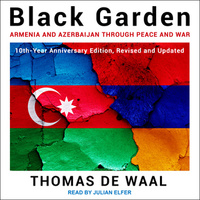Take a photo of a barcode or cover
challenging
dark
informative
medium-paced
its depressing that the best book on armenia-azerbaijan relations came out 12 years ago, but it is indispensible.
A thorough accounting of a conflict whose existence I had frankly missed until it flared up again in late 2020, and which seems as unresolveable as Kashmir or the West Bank. It is also very reminiscent of the Balkans, but without the large-scale Western military intervention (which was happening at the same time!).
3.5. disappointing editing: formatting, mechanics, even spacing were distracting, and the circular chronology does the reader no favors. still one of the most comprehensive NK accounts.
informative
reflective
sad
medium-paced
Edit: I stopped trusting this guy after his blatant ignorance in the second Karabakh war. His false equivalency and the failure to report and highlight many crimes being committed by Azerbaijan long after the war are deal-breakers for me.
====
I think this book is a very useful tool for the people of Armenia and Azerbaijan (and anyone else interested) who are trying to find out the truth behind national myths and political propaganda. While I cannot assess the accuracy of every bit in the book, I felt that the author is genuinely trying to be objective. As an Armenian I have indeed barely heard about the hardships that displaced Azerbaijani people have faced, and the book revealed some uncomfortable and inconvenient points to me. I bet an open minded Azerbaijani would have the same emotional roller coaster when learning about Armenian history. In any case, the book is a good start for navigating this complex topic. I hope that our nations will ultimately find an acceptable solution and not engage in the inhumane activities of war. I am not a naive pacifist and know that in the current climate Armenia needs a strong army but I truly hope that our respective governments will have the wisdom not to gamble on the lives of young soldiers. War is always a human tragedy no matter what. Hopefully we will see the day when this nightmare ends.
PS: the fact that both Armenians and Azerbaijanis find the book biased is a good sign. Personally, my goal was to have my views challenged and the book provided the desired alternative viewpoint. Otherwise, it's always advised to take things with a grain of salt. Three stars because of the style which was a bit repetitive at times.
====
I think this book is a very useful tool for the people of Armenia and Azerbaijan (and anyone else interested) who are trying to find out the truth behind national myths and political propaganda. While I cannot assess the accuracy of every bit in the book, I felt that the author is genuinely trying to be objective. As an Armenian I have indeed barely heard about the hardships that displaced Azerbaijani people have faced, and the book revealed some uncomfortable and inconvenient points to me. I bet an open minded Azerbaijani would have the same emotional roller coaster when learning about Armenian history. In any case, the book is a good start for navigating this complex topic. I hope that our nations will ultimately find an acceptable solution and not engage in the inhumane activities of war. I am not a naive pacifist and know that in the current climate Armenia needs a strong army but I truly hope that our respective governments will have the wisdom not to gamble on the lives of young soldiers. War is always a human tragedy no matter what. Hopefully we will see the day when this nightmare ends.
PS: the fact that both Armenians and Azerbaijanis find the book biased is a good sign. Personally, my goal was to have my views challenged and the book provided the desired alternative viewpoint. Otherwise, it's always advised to take things with a grain of salt. Three stars because of the style which was a bit repetitive at times.
challenging
informative
reflective
slow-paced
challenging
dark
informative
reflective
tense
medium-paced
dark
emotional
informative
reflective
sad
tense
slow-paced
“The 18th century Armenian troubadour Sayat-Nova, who wrote jn Armenian, Georgian, and the lingua france of the Caucasus of the time, Azeri... he thought of himself as a bridge builder. In one of his Azeri poems he elgizes on his posthumous fate:
Mercy on the old master building a bridge,
The passer-by may lay a stone to his foundation.
I have sacrificed my soul, worn out my life, for the nation.
A brother may arrange a rock upon my grave.”
2020 Artsakh (Nagorno-Karabakh)- Azerbaijani war brought me to this book to educate myself on the conflict. There is so much misinformation by both Armenians and Azerbaijanis that I needed someone unbiased. While I have seen many Armenians and Azeris claiming this book is biased, I would disagree greatly. It corresponded with other things I have read and heard throughout my life. For me, this book is a valid source, Waal’s job in this book was immaculate, it showed how before the 19th century Armenians and back then Tatars (Azeris) were living quite well together and share similarities in many aspects.
Claiming that Armenians hasn’t done messed up things is as wrong as Azeris claiming they are blameless.
Nationalism brings the ugly in any nation. While i am a patriotic Armenian, I seek the truth and don’t hide myself from the truth, and I hope many Azeris and Armenians will follow the suit and seek the truth, even if the truth isn’t pleasant.
Highly recommend this book. 5 stars definitely
Mercy on the old master building a bridge,
The passer-by may lay a stone to his foundation.
I have sacrificed my soul, worn out my life, for the nation.
A brother may arrange a rock upon my grave.”
2020 Artsakh (Nagorno-Karabakh)- Azerbaijani war brought me to this book to educate myself on the conflict. There is so much misinformation by both Armenians and Azerbaijanis that I needed someone unbiased. While I have seen many Armenians and Azeris claiming this book is biased, I would disagree greatly. It corresponded with other things I have read and heard throughout my life. For me, this book is a valid source, Waal’s job in this book was immaculate, it showed how before the 19th century Armenians and back then Tatars (Azeris) were living quite well together and share similarities in many aspects.
Claiming that Armenians hasn’t done messed up things is as wrong as Azeris claiming they are blameless.
Nationalism brings the ugly in any nation. While i am a patriotic Armenian, I seek the truth and don’t hide myself from the truth, and I hope many Azeris and Armenians will follow the suit and seek the truth, even if the truth isn’t pleasant.
Highly recommend this book. 5 stars definitely
http://nhw.livejournal.com/125758.html[return][return]This is a really good book. Even if you don't have a professional interest in the Nagorno-Karabakh question (and let's face it, not a lot of people do), I think the studies of how a historical dispute over a very small patch of land destroyed two countries and helped to destroy the Soviet Union are of worldwide, human interest. The narrative of the conflict is interspersed with either interviews with today's survivors or historical reflections on how we got there.[return][return]The first few chapters are also particularly interesting because of the light they throw on Gorbachev, especially from research in the Politburo archives. In a week when we have all been debating the extent to which Ronald Reagan deserves any credit at all, I found this September 1988 exchange between the General Secretary and the hapless official in charge of preventing the conflict illustrative of the fantasy world in which the leadership of the other superpower lived:[return][return][Gorbachev] rang and said:"... Tell them that if they don't stop this, we will expel them from the Party!" I said, "Mikhail Sergeyevich, they've already trampled on their party cards. The members of the committee are all the organisers of these demonstrations!... What Party methods are you talking about?" [return][return]Two years later, of course, the Soviet Union suddenly collapsed completely. This was one of the few warning signs. (Also the August 1990 coup attempt in Moscow had a direct effect on the outcome of the war.)[return][return]The interesting human story is what happens to people who used to live in a society that has been destroyed. The chapters about the massacre in Sumgait in early 1988, and about the children of Azerbaijan's 750,000 refugees, are particularly vivid.



